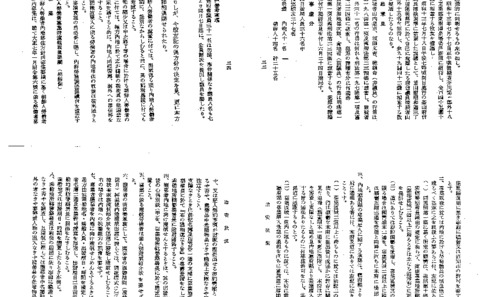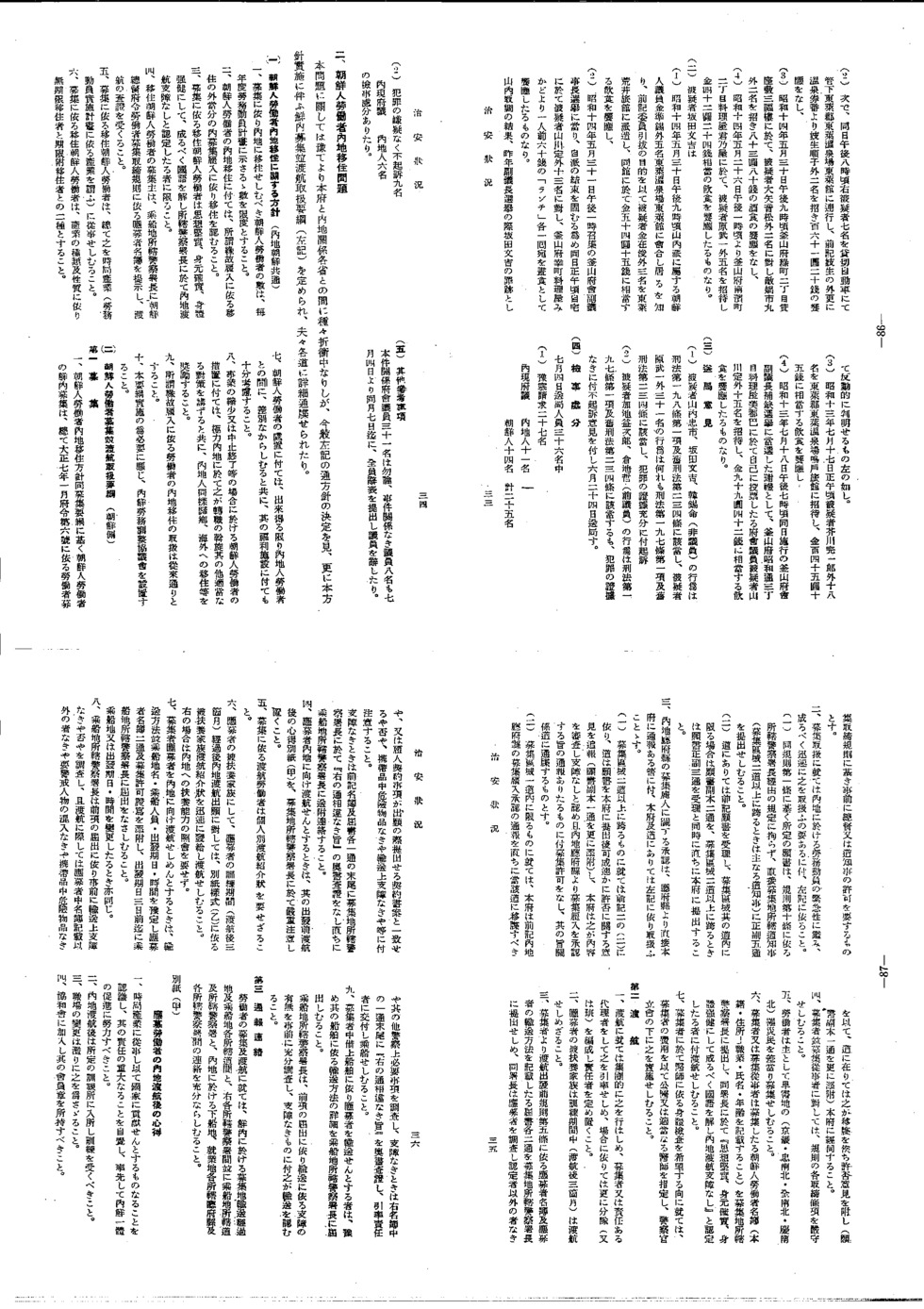Guidelines concerning Recruitment of Korean Workers and Handling of Their Passage
- Author
Page 1
- The Problem of Migration of Korean Workers to the Homeland
Having engaged in various negotiations concerning this problem, the Office of the Governor-General of Korea and related ministries in the homeland have determined the policy laid out below. Furthermore, the Guidelines concerning Recruitment of Korean Workers and Handling of their Passage (below) have been stipulated and detailed notification shall be provided to each province.
- Policy concerning Migration of Korean workers to the Homeland (applies to both the homeland and Korea)
- The number of Korean workers who migrate to the homeland through recruitment shall be at a maximum the number indicated in the annual labor mobilization plan.
- Regarding the migration of Korean workers to the homeland, among those to whom migration through so-called “employment through connections” is applicable, migration through recruitment and employment shall be recognized.
- Recruited Korean migrant workers shall be limited to persons who are sound in thought, background, and body, who preferably understand the Japanese language, and regarding whom the chief of the police station with jurisdiction recognizes that there is no problem concerning their passage to the homeland.
- Recruiters of Korean migrant workers shall submit a register of the recruited workers to the chief of the police station with jurisdiction over the place of embarkation in accordance with the Regulations for Recruitment of Workers issued by Ordinance of the Office of the Governor-General of Korea and shall receive a certificate of passage.
- Recruited Korean migrant workers shall all engage in work in the designated war industries (industries operating in accordance with the labor mobilization plan).
- Recruited Korean migrant workers shall be divided into two categories according to the type and nature of the industry: indefinite migrants and fixed-term migrants.
- The treatment of Korean workers shall as far as possible be no different from that of Japanese workers and sufficient consideration shall be given to their welfare facilities.
- Regarding the treatment of Korean workers in the event of the reduction or termination of work, services for transfer and other appropriate measures shall be taken as far as possible in the homeland and, as in the case of Japanese workers, they shall be given incentives to return home, move overseas, etc.
- The handling of migration to the homeland of workers through so-called “employment through connections” shall be the same as before.
- If it is necessary for the implementation of these Guidelines, a Japan-Korea labor coordination council will be set up.
- Guidelines concerning Recruitment of Korean Workers and Handling of Their Passage (guidelines for Korea)
- Recruitment
- The recruitment of Korean workers in Korea based on the Korean Worker Homeland Migration Policy and Recruitment Guidelines requires the prior authorization of the Governor-General of Korea or the prefectural governor based on the Regulations for Recruitment of Workers in accordance with Ordinance No. 6 of the Office of the Governor-General of Korea of January 1918 (hereinafter referred to as “the Regulations”).
- In view of the urgent need for labor mobilization in the homeland, the handling of recruitment shall be conducted as swiftly as possible as stated below.
- Five originals and copies of the written application stipulated in Article 1 of the Regulations shall be submitted directly to the provincial governor with jurisdiction over the place of recruitment (or to the main provincial governor if the region of recruitment covers two or more provinces), notwithstanding the requirement of the approval of the Chief of Police with jurisdiction stipulated in Article 10 of the Regulations.
- Upon receiving the above-mentioned application, the province shall immediately submit to the Office of the Governor-General of Korea two copies of the application if the recruitment area is limited to within the province or three originals and copies of the application if the recruitment area covers two or more provinces.
- The approval of prefectures in the homeland regarding recruitment and employment should be communicated directly by the prefecture to the Office of the Governor-General of Korea and shall be handled by the Office of the Governor-General and the provinces as stated below.
- When the recruitment area covers more than one province, in accordance with 2) (2) above, the provinces concerned shall additionally send their opinion concerning permission (attaching one more copy of the application) as soon as possible after submitting the application to the Office of the Governor-General of Korea and, provided that it considers that there is no problem after having studied these contents, the Office of the Governor-General shall grant permission for recruitment and employment regarding applications that have received notification of authorization from the prefecture concerned in the homeland and shall notify the provinces concerned.
- When the recruitment area is within one province, the Office of the Governor-General of Korea shall swiftly send to the province concerned the above-mentioned notification of authorization from the prefecture concerned in the homeland. The province shall await this notification and send its opinion concerning permission to the Office of the Governor-General (attaching one more copy of the application) and ask for its approval.
- Strict observation of all the stipulations of the Regulations shall be imposed upon recruiters and parties engaged in recruitment.
- Workers shall for the time being be recruited from among victims in the drought-affected regions (Gyeonggi Province, North and South Chungcheong Provinces, North and South Jeolla Provinces, and North and South Gyeongsang Provinces).
- The recruiter or party engaged in recruiting shall submit a register of recruited Korean workers (indicating legal domicile, address, occupation, name and age) to the chief of the police station with jurisdiction over the area of recruitment, and passage shall be permitted upon authorization by the said chief of police that they “are sound in thought, background, and body, and preferably understand the Japanese language, and present no problem regarding passage.”
- Recruiters who wish physical examination of workers to be conducted by a doctor shall appoint an official doctor or other suitable doctor at their own expense and conduct the examination in the presence of a police officer.
- Passage
- Passage to the homeland shall be conducted collectively. The recruiter or its responsible representative must be in charge of the group and, according to the circumstances, a squad (or group) shall be formed and a person in charge appointed.
- Dependent families of applicants may not travel to the homeland during the training period (three months after passage).
- Prior to departure for the homeland, the recruiter shall submit to the chief of the police station with jurisdiction over the area of recruitment two copies of the register of applicants in accordance with Article 5 of the Regulations and two copies of a notification indicating the means of transport to be used by the applicants. The said chief of the police station shall investigate the applicants to confirm that there are no persons other than the authorized persons, whether or not the matters in the employment contract are the same as those in the draft contract submitted at the time of application, and that there are no dangerous articles or articles that interfere with transportation among the belongings, or any other matters requiring attention.
In the event that there are no problems, the chief of the police station with jurisdiction over the area of recruitment shall provide certification by attaching the statement “I hereby certify that the above is true and correct” at the end of one copy each of the above-mentioned register of applicants and notification and shall immediately send it to the chief of the police station with jurisdiction over the place of embarkation.
- When applicants are to embark on passage to the homeland, the chief of the police station with jurisdiction over the area of recruitment should ensure that applicants strictly observe the attached Rules of Conduct (Attachment A) prior to departure and after arrival.
- Workers undertaking passage through recruitment are not required to have an individual letter of introduction for passage.
- In response to application by dependent families of applicants following the completion of the period of training (three months after passage), letters of introduction for the passage of dependent families shall be promptly issued and provided using the attached form (Attachment B).
In the above circumstances, there shall be no need to conduct an inquiry into capacity to support dependents.
- When a recruiter is to have applicants undertake passage to the homeland, the means of transportation, place of embarkation, number of passengers, and date and time of departure shall be planned and notified to the chief of the police station with jurisdiction over the place of embarkation at least three days prior to departure, together with two copies of the register of applicants and a photograph of the recruitment permission certificate.
The above shall also apply in the event that any change is made to the place of embarkation or date and time of departure.
- The chief of the police station with jurisdiction over the place of embarkation shall, in accordance with the notification, determine in advance whether or not there is any problem with the transportation, investigate that there are no persons at the time of passage other than those on the register of applicants, that no persons requiring vigilance are among the passengers, that there are no dangerous articles among the passengers’ belongings, and any other necessary police matters. In the event that there are no problems, the chief of the police station shall provide certification by attaching the statement that “I hereby certify that the above is true and correct” at the end of one of the registers of applicants, pass it to the person in charge, and have the passengers embark.
- Recruiters who plan to transport applicants using a leased vessel shall submit details of the means of transportation by the vessel in advance to the chief of the police station with jurisdiction over the place of embarkation.
The chief of the police station with jurisdiction over the place of embarkation shall determine sufficiently in advance whether or not there is any problem with transportation in accordance with the above-mentioned notification, and shall grant permission on transportation if there is no problem.
- Communication
Regarding the recruitment and passage of workers, sufficient communication shall be maintained among the authorities of the area of recruitment, area of transportation and place of embarkation; among the police stations with jurisdiction over them, and between these authorities and police stations; as well as among the provinces and police stations with jurisdiction over the places of embarkation in Korea, and the prefectures with jurisdiction over the places of disembarkation and places of employment and the police stations with jurisdiction over them in Japan.



